Reputation DAO: Establishing an On-Chain Credit System and Exploring Broad Use Cases for DeFi
Original Author: Shiwen
In fields such as finance, consumption, education, and social interaction, credit plays an important role. Credit scoring systems are very common in our daily lives. For example, shared power banks can offer deposit-free services based on credit scores, higher credit ratings on Taobao can enjoy rapid refund services, and bank credit scores can be used to assess eligibility for large loans. These actions all require credit scores as endorsement.
So where does credit data come from? In fact, all data can be considered credit data, including borrowing limits, educational background, occupational income, email, phone numbers, and addresses, as well as consumption habits and hobbies, which can all be collected through big data and used to assess an individual's credit score. In addition to enjoying some extra services, credit scores can also serve as a basis for determining a user's ability to repay loans.
In addition to individual credit scores, some large institutions, shops, and products also have credit scores. They can generate credit scores based on user evaluations, product sales, shop reputations, etc., to determine whether they are trustworthy (for lending).
In the world of Web3, financial scenarios, social behaviors, and transaction methods have undergone significant changes. Furthermore, DeFi has redefined the global financial industry, bringing obvious advantages in financial inclusivity, accessibility, payment speed, and flexibility. With the high adoption of DeFi, credit scoring systems have also become a crucial component. However, the data of individual assets and transactions participating in DeFi are recorded on-chain, while traditional financial, credit scoring, and bank assessment data are off-chain. How to achieve data interaction between on-chain and off-chain, securely transfer real-world data to the blockchain, and create a comprehensive credit system for DeFi is one of the pressing issues to be solved.
Based on this, on-chain credit scoring systems like Reputation DAO are continuously emerging and developing.
Reputation DAO is a bridge between DeFi and traditional finance, enabling individuals to leverage their real-world financial data and identity when interacting with smart contracts. It utilizes a powerful data flow engine to unlock broader use cases in DeFi by analyzing on-chain accounts, oracles, and specific DAO data.
It is launched by the Australian blockchain platform Mycelium, whose previous product was Tracer DAO, a derivatives ecosystem deployed on Arbitrum, currently with a total trading volume of $137,154,334.
Recently, Reputation DAO announced the completion of a $4.75 million seed round financing, with participation from DACM, AirTree Ventures, Koji Capital, and Framework Ventures. Chainlink co-founder Sergey Nazarov has also joined Reputation DAO as an advisor.
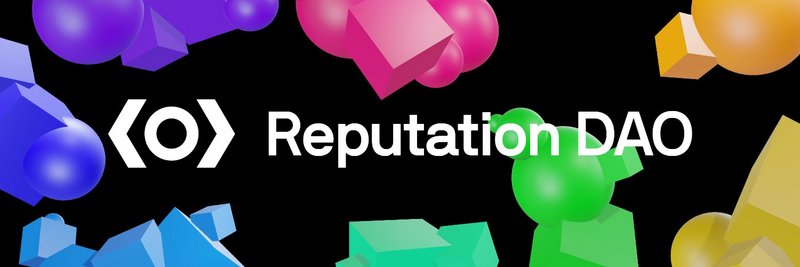
DeFi lending is still in its early stages
In recent years, DeFi has been in a phase of rapid growth, with new products emerging one after another and an increasing number of investors and funds flowing into the DeFi market. As products continue to be updated and iterated, their architecture and yields have also become more mature and stable. Investors are no longer limited to liquidity mining but are also involved in lending, algorithmic stablecoins, and diversified income-generating products.
According to DefiLlama data, as of now, the total locked value in DeFi is $211B, with lending protocols accounting for 23.69% of the total TVL, totaling 140 projects, ranking second. The first place is held by decentralized exchanges.

In contrast to this achievement, the structure of the DeFi lending market has not yet matured. This is reflected in the relatively weak data integration capabilities of DeFi, the lack of a credit scoring system, and the inability to widely extend the credit chain, resulting in the phenomenon of over-collateralized loans (and the accompanying inefficiency of capital) still existing.
Reputation DAO is a verifiable, decentralized, and programmable DeFi credit scoring system that can map off-chain data, such as AML/KYC, traditional credit scores, and social media data, providing trustworthy neutral credit services for Chainlink oracles, DAOs, smart contract protocols, and their users to enhance the assessment of specific account risk indicators and reduce the mortgage process, making uncollateralized loans possible.
How does Reputation DAO work?
Specifically, Reputation DAO will collect and analyze credit data through the following methods.
1. Scanning and Connecting
With Reputation DAO, DeFi users can scan and check the security of the underlying oracle data in their smart contracts. By building a data aggregation pipeline, any EVM-based data can be quickly transmitted. With credit links, users can understand the performance of oracles and gain insights into specific data feeds. Reputation DAO focuses on scanning data from individual DeFi accounts, oracles, and DAOs.
Then, it will use a decentralized oracle network supported by Chainlink to connect to the necessary relevant off-chain credit services, such as identity services, related AML/KYC checks, FICO/Vantage scores, and relevant social media data.
2. Analyzing and Calculating
After obtaining the data, Reputation DAO will analyze and rank the scanned data related to individual accounts, oracles, and DAOs. Reputation DAO has developed RepScores, a reputation scoring algorithm that uses on-chain data sources. Integrating RepScores into contracts can reduce the collateral requirements for individuals in DeFi.
3. Visualization
The analyzed data will be visualized so that users can utilize and understand their own or others' on-chain interaction information. Accounts, oracles, and DAOs will be able to view and check their transaction history on-chain while assessing relevant credit indicators. Credit data will be publicly accessible through a free API.
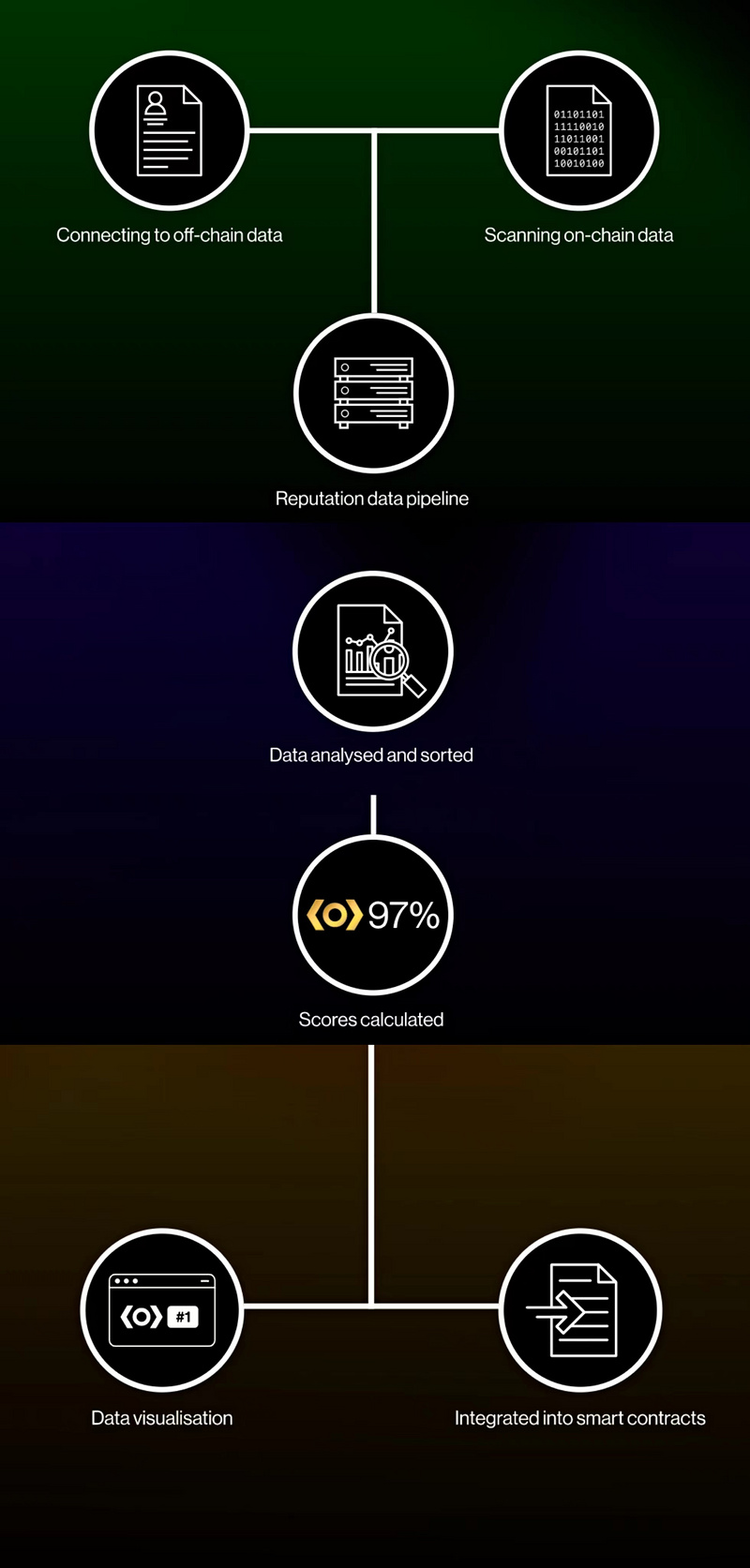
Reputation DAO's First Product------Oracle Reputation
Reputation DAO will create different platforms and applications to obtain credit serving the open blockchain ecosystem. The first product is Oracle Reputation. Oracle Reputation transforms on-chain information about oracle quality into knowledge that humans (and machines) can use to make decisions. Oracle Reputation uses the Repscore model to attach human-readable and programmable knowledge to Web3 by coordinating and aggregating credit indicators.
Currently, data analysis of oracles, contracts, and integrated protocols can be viewed on Oracle Reputation.
1. Oracles
For example, Oracle Reputation ranks oracles based on average deviation or total transaction volume submitted. These rankings allow users to quickly understand the reliability of oracles.
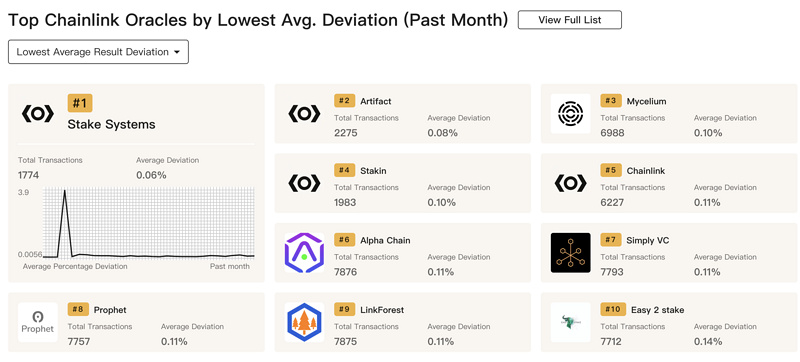
2. Contracts
Users can view the submission time of oracle contracts on-chain, the deviation between the oracle's data and real data, and the amount of ETH held by the oracle address, among other things.
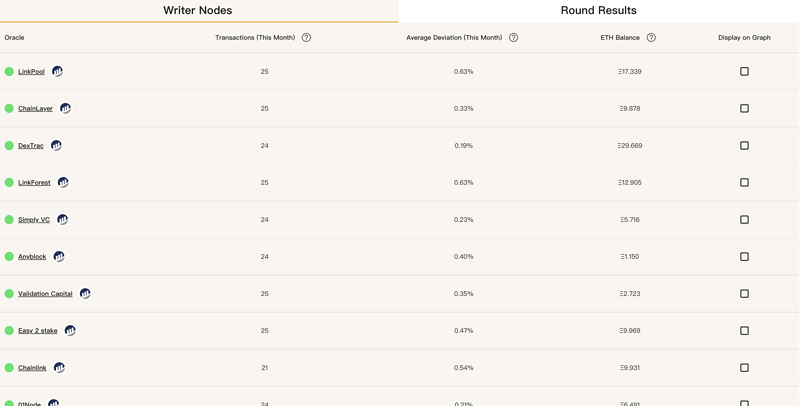
3. Protocols
The Oracle Reputation V2 platform has updated a new feature------Protocol Visualization Environment (PVE), which can be used with DeFi protocols integrated with Reputation DAO. It is a widget displayed on the protocol's frontend. When users click on the widget, it directs them to the data dashboard of that protocol on Oracle Reputation, where they can view data related to that protocol.
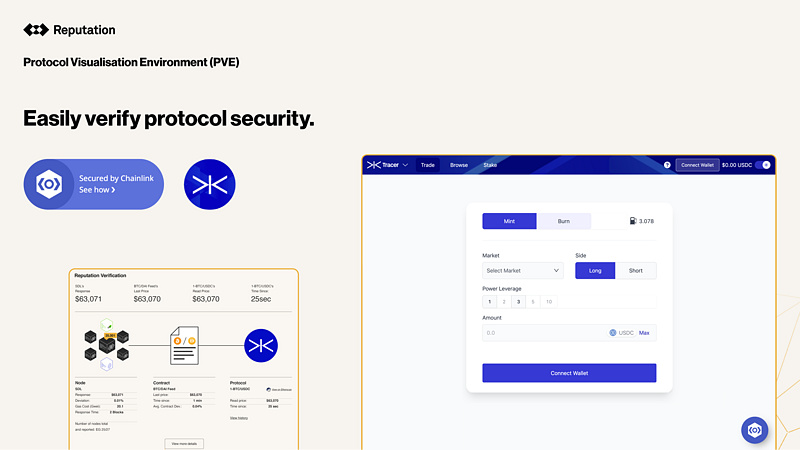
Currently, Oracle Reputation has integrated Aave, Tracer DAO, Arbitrum, and DeFi Safety. Users can check the data security of specific protocol oracles based on their needs.
For example, it provides the following data for Aave:
The prices and times read by the Aave contract from Chainlink, as well as price updates from individual oracles and oracle networks.
Daily and hourly TVL, expected gas and paid gas, as well as the scale and number of loans.
An overview of all data sources used by Chainlink on its platform, including logs of recent transactions.
The Reputation Widget displays the end-to-end data supply chain for each Aave contract. Aave users can gain a clearer understanding of how oracles and Chainlink contracts interact with smart contracts on the Aave protocol.
It makes it easier for users to conduct due diligence, allowing them to trade on the Aave network with peace of mind. This helps users build trust in the protocol.

Future Development Roadmap of Reputation DAO
Reputation DAO is developing:
1. Repscore------Oracle Credit Scoring Model
Repscores use an open-source relative performance ranking (RPR) model to assess the performance of each oracle and generate a "credit score" from 1 to 100. This model will provide a standard framework for comprehensive assessment and measurement of oracle performance.
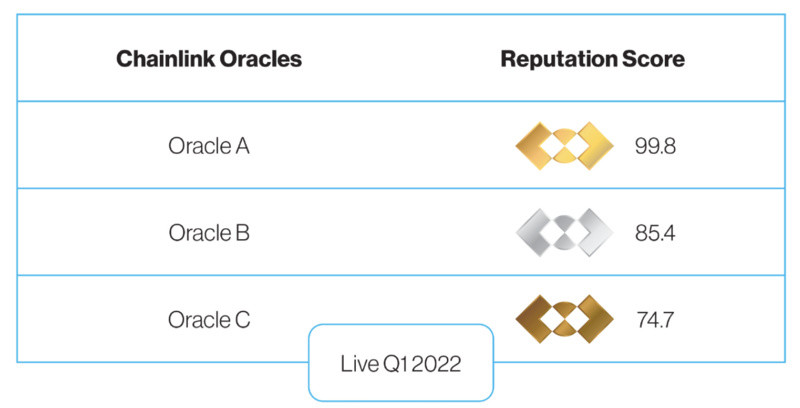
2. Monitoring and Alerts for Oracles
This feature can immediately notify users when an oracle fails. Users will be able to choose under what circumstances they want to be notified and how they receive notifications.
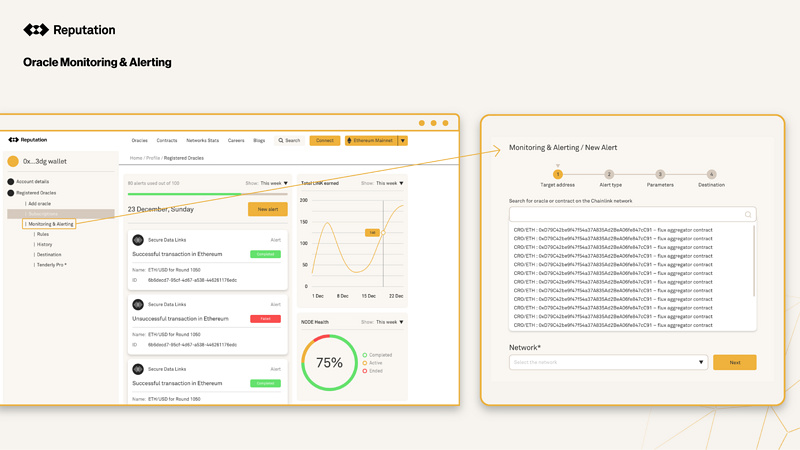
Richard Galvin, co-founder and CEO of investor DACM, stated, "Credit scoring is a key function of banks and external providers in the traditional financial system. So far, this clarity has not been a feature of DeFi for borrowers and lenders. With the maturation of the ecosystem and the rise of independent, reliable information DAOs, we believe Reputation DAO is the infrastructure for the next growth phase of the industry."
Indeed, the interoperability between DeFi and traditional finance can provide trillions of dollars in capital and billions of user traffic, with the credit system being an indispensable part of it. Reputation DAO provides a channel for these data flows into smart contracts, along with higher security, interest rates, and guarantees.









